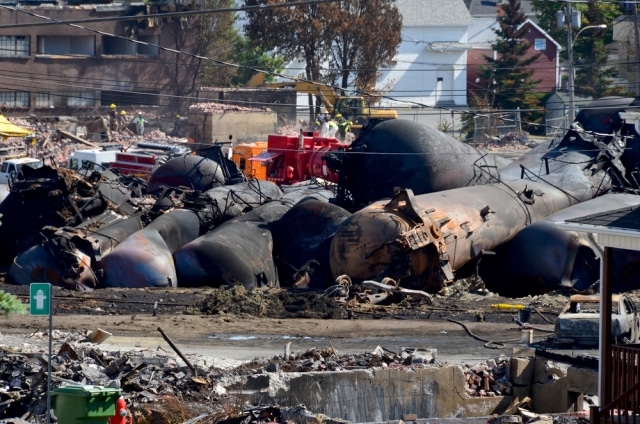Last year, Jeffrey Wiese, an official with the Pipeline and Hazardous Materials Safety Administration (PHMSA) told an industry conference that the regulatory process was “kind of dying.”
According to InsideClimate News, Wiese even mentioned that PHMSA was working on a YouTube channel to “persuade the industry to voluntarily improve its safety operations,” as this was one of the only ways it could attempt to improve safety.
PHMSA is the organization in charge of developing new regulations regarding the transportation of crude oil in rail tank cars.
This week, the Department of Transportation, along with PHMSA, announced its new safety advisory regarding the rail transport of Bakken crude oil. As another example of how the regulatory process is “kind of dying,” the advisory includes no new regulations regarding rail tank cars but “strongly urges” the oil and rail industry to use safer tank cars.
The advisory makes it clear that oil companies only have to be as safe as they can be while using the existing tank car “fleets” and that they should avoid using older DOT-111 cars to “the extent possible.”
The dangerous DOT-111 tank cars currently make up approximately 70 percent of the existing fleet of tank cars used for moving oil by rail.
This advisory is just the latest in a long stream of recent safety measures, both voluntary and regulatory.
After it was discovered that much of the crude oil in the Lac-Megantic oil train disaster had been misclassified by the oil companies, PHMSA announced “Operation Classification,” a program to evaluate the oil industry’s testing and classification of Bakken Crude prior to it being shipped in rail tank cars. In this case, there are actual regulations requiring companies to do this.
In February, PHMSA announced the first results of this program. The administration tested 18 samples and found 11 of them to be misclassified.
In January, the oil industry had agreed to voluntarily provide PHMSA with more information about the characteristics of Bakken crude oil based on the industry’s tests. When questioned about the status of this program at a Senate hearing in April, Department of Transportation Secretary Anthony Foxx replied, “Unfortunately, I am here to deliver the news that at this point we have not received a robust sampling.”
At the time, the agency had only received responses from three oil companies. Now, nearly a month later, the PHMSA website still only shows results from three oil companies.
At a recent Senate hearing, National Transportation Safety Board (NTSB) Chairman Deborah Hersman, stated that no community was prepared to respond to a worst-case oil-by-rail disaster. And she made it clear the only thing that would change that would be oil and rail companies putting in place the resources to support first responders.
We have to have a support structure in place for them and that is the obligation of the shippers and the transporters to make sure that that happens. They are the best equipped to do that and they can do that by contracting with resources all along the route so that there is a rapid response. The communities that are along the rights-of-way deserve it.
Up until this point, any efforts by the oil and rail industry to help first responders be prepared for an oil-by-rail accident have been voluntary — which might be one of the reasons no community is prepared.
There are multiple examples of local first responders asking for help from the railroads and getting no response, like this one reported by the Syracuse New Times:
The Syracuse deputy fire chief responsible for hazardous materials says that the county is still trying to get information from the railroads and has done no training specific to the derailment of a shale oil train.
Trains full of Bakken crude oil have been traveling through Syracuse daily for more than two years.
Recently, the rail industry said it will collectively commit $5 million by July 1 to help prepare first responders across the country. While this is a start, it is also less than the $6.5 million the American Association of Railroads voluntarily spent on lobbying last year.
In a February congressional hearing on oil-by-rail safety, NTSB board member Robert Sumwalt testified about the dangers of the existing tank cars.
“Recent serious and fatal accidents reflect substantial shortcomings in tank car design that create an unacceptable public risk,” he said.
In late April, an oil train with these tank cars traveling through Lynchburg, VA, at just 24 mph, derailed, caught fire and spilled oil into the James River.
And in response, PHMSA and the Department of Transportation have once again asked the oil and rail industries to volunteer to address this unacceptable public risk.
In April, NTSB Chairman Hersman was clear what it would take to get regulators to act, describing the reality of her ten years at NTSB:
“[I’ve] seen a lot of difficulty when it comes to safety rules being implemented if we don’t have a high enough body count.”
These recent voluntary measures regarding the DOT-111 tank cars almost ensure that eventually we will have a high enough body count. And then, perhaps some new regulations.
Image credit: Lac Megantic oil train explosion aftermath via Shutterstock.
Subscribe to our newsletter
Stay up to date with DeSmog news and alerts







